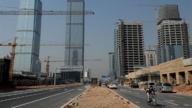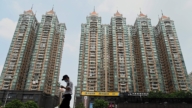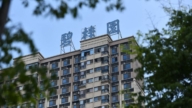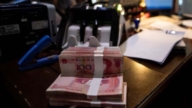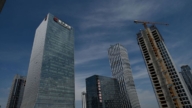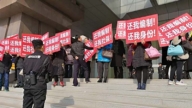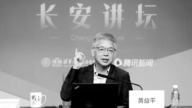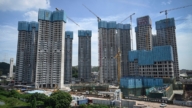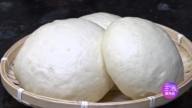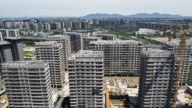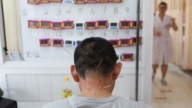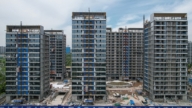【新唐人2014年05月16日讯】日前,中共央行要求商业银行及时审批和发放符合条件的个人住房贷款。外界认为,今年以来,房地产下滑,导致中国各项经济指标明显出现疲软迹象,央行企图再次出手救市。不过,专家指出,让政府来控制经济发展,已经使中国经济陷入两难境地,政府不刺激房地产经济会下滑,而刺激又会导致金融危险。
5月12号,在中共央行副行长刘士余主持的会议上,央行官员与15家大型银行的高管,讨论了住房抵押信贷政策。央行要求与会的商业银行提高服务效率,及时审批,和发放符合条件的个人住房贷款,合理确定“首套房”贷款利率水平。
参加会议的包括工商银行、农业银行、中国银行、建设银行、交通银行等15家商业银行的高管。
大陆金融分析师任中道:“房地产跟中共政府的利益是极度相关的,因为很多的地方政府的债务,承诺是以土地出让的收入,作为偿还债务的条件,一旦没有钱,开发商倒闭,银行出现问题,坏账成堆,地方政府出现债务违约,这些都是关联在一起的。”
北京大学光华管理学院博士生导师王建国:“不放贷的话,房地产的下滑雪上加霜,很多就垮掉了,本来现在经济就不是很景气,主要是起这个作用。第二也是救市,房地产崩盘的话,对中国经济的打击,那就是金融危机,但是,3、4线城市和2、3线城市已经垮得很厉害,即使放开贷款,也不见得就救得了房地产,这种形势,只怕也没有很多人去买房子。”
房地产业在整个社会的产业链中影响到方方面面,前端是原材料,钢材、水泥等建材﹔中间产品关系到设计、建筑工程、装修等行业﹔而最后形成的商业物业和住房,拉动市场活动等,比如入住者购买家电、家俱、床上用品等消费品﹔另外还有很多文化属性产品,有了房子,年轻夫妇还会考虑生孩子,又涉及婴幼儿用品、教育等产业。
据中共统计局发布的最新统计数据,今年1-4月份,住宅房销售额同比下降了9.9%,办公楼销售额下降10.2%。而4月末,商品房等待销售的面积高达5万2652平方米而建筑开工数量下滑了近25%。
统计局发布的另一份4月份数据表明,房地产市场的放缓,已经对工业产值、零售额以及机械、土地和其他实物资产的投资造成连锁效应,所有这些指标都低于预期。
美国《华尔街日报》评论说,实际放缓势头比数据显示的可能更惨。
大陆投资顾问邓先生:“房地产是个综合产业,它的风险其实早已分散到各行各业去了,起来的时候是众星捧月,垮的时候肯定是节节败退,本身它是一种刚需,但问题是它已经过剩和泡沫。”
为提振需求的不足,中共领导人在今年2月宣布了一系列“微刺激”政策,包括针对中小企业的税费减免措施,和增加交通设施投资等。
王建国:“事实上,真正害怕房地产下跌的还是政府,原来那些调控政策,并不是要真的要把房地产调下去。房地产如果崩盘的话,对银行打击非常大,那些存款就会有风险,银行就会有倒闭的可能,那政府要救银行又得发钞票,发钞票又会导致通货膨胀,本来钞票发的就很多了,所以中国现在这个经济很麻烦,房地产刺激会有金融风险,不刺激经济又下滑。”
今年一季度,四个省份的房地产投资为负值,其中黑龙江和吉林的降幅超过了25%。财经学者杜猛不久前表示,中国楼市已经出现典型的生产过剩危机,全国有6800万套空置房。日本《野村证券》也曾指出,中国住房已经严重过剩,房地产的泡沫已经破裂。
采访编辑/刘惠 后制/钟元
Housing Oversupply Causing Major Crisis for Chinese Economy
Recently the Chinese Communist Party (CCP)’s Central Bank
asked commercial banks to timely approve and issue
housing loans to qualified individuals.
The outside world thinks the YTD real estate market slide
has caused economic indicators to clearly signal a softening.
The Central Bank attempts another bailout.
However, experts point out that Governmental control of
economic growth has led to a dilemma in the Chinese economy.
Without governmental stimulation, the real estate market will
collapse; while the stimulus will lead to financial dangers.
During the meeting chaired by CCP Central Bank
Vice Governor Liu Shiyu on May 12,
Central Bank officials and executives of 15 large banks
discussed mortgage and credit policies.
The Central Bank asked commercial banks to timely approve
and issue loans to qualified individuals,
and set reasonable interest rates for first-time home buyers.
Fifteen commercial banks joined the meeting, including
Industrial and Commercial Bank of China,
Agricultural Bank of China, Construction Bank
and Bank of Communications.
Chinese Financial Analyst Ren Zhongdao: “Real estate is
closely tied to the interests of the CCP Government.
A lot of Local Government’s debts are based on land revenue.
If there was no money, developers would go bankrupt,
banks would run into problems, bad debts would accumulate
and Local Government debts would default. All these are related."
Beijing University Guanghua School of Management
doctoral advisor Wang Jianguo: “Without issuing loans,
the real estate market will drop further and even collapse.
The economy is already not very good at present.
Secondly it helps save the market.
A real estate crash would cause financial crisis in China.
However, the real estate at second tier, third tier
and fourth tier cities has dropped badly.
Even with loans freed up, it would not save the market.
In such a situation, I’m afraid not many people would buy."
Real estate impacts many aspects of the industrial chain.
The front end is about raw materials, steel, cement
and other building materials;
middle level products are design, construction,
furnishing and other industries,
while the final level is around commercial property and housing,
such as appliances, furniture, bedding and other consumer goods.
There are also cultural attributes. Young couples would consider
having children and that leads to infant supplies, education and
other industries.
According to the latest data released by the Bureau of Statistics,
the sales of residential housing fell by 9.9% and the sales of
office building fell 10.2% from January to April 2014,
compared to the same period in 2013.
Ar the end of April, the commercial housing inventory
reached 52,652 square meters, while new construction
dropped nearly 25%.
Another set of data released by the Bureau of Statistics in April
showed that the slowdown in the real estate market has caused
a chain effect on industrial output,
retail sales and investment in machinery, land and other physical
assets..All of these indicators are lower than expected.
U.S. Wall Street Journal commented that the actual
slowdown may be even worse than what the data shows.
Chinese investment consultant Mr. Deng: “Real estate is a
comprehensive industry and its risks have in fact already
penetrated into all walks of life.
When it is prosperous, everyone worships it;
when it collapses, it is definitely out of favor.
It is a demand all by itself. But the problem is that it has
boom and bust cycles."
To boost demand, the CCP leaders announced a series of
“micro-stimuli" policies in February, 2014,
including tax relief measures for small and medium enterprises,
and increasing investments in transportation facilities.
Wang Jianguo: “In fact it is the Government who is afraid of
a real estate crash.
Its original control policy was not really to push down real estate.
A real estate collapse would be a very big blow to the banks.
Deposits would be at risk, so banks would likely collapse.
Then the government would again need to save banks by printing
money, which leads to inflation.
China has printed too much money already. China’s economy
is in trouble.
Stimulating real estate has financial risks,
But not to stimulate, the economy would decline. “
In Q1 2014,real estate investment in four provinces
were negative,
with Heilongjiang and Jilin declining more than 25 %.
Finance scholars Du Meng recently said that
China’s property market is in a typical crisis of overproduction,
with 68 million vacant housing units.
Japan’s Nomura Securities also pointed out that
China has a serious surplus of housing and the real
estate bubble has burst.
Interview & Edit/Liu Hui Post-Production/Zhong Yuan


